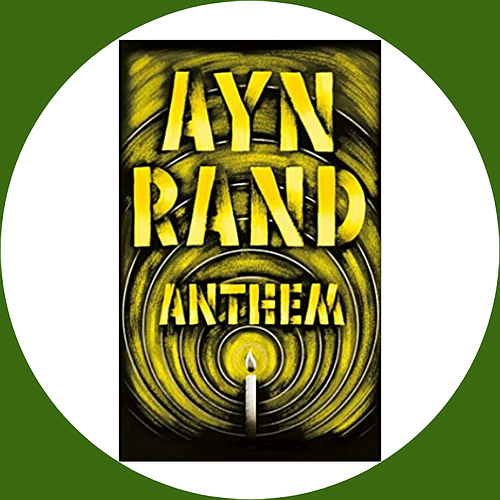- July 26, 2024
-
-
Loading

Loading

Amid the COVID-driven lockdowns in cities and states nationwide; governors and mayors arbitrarily destroying businesses and the families that depended on them; Big Tech censorship becoming its own lethal, tyrannical virus; while watching the surreal and bizarre events surrounding November’s elections; and hearing over and over how the Biden administration will issue 100-day decrees and exponentially widen the scope and reach of Big Brother Washington.
All of that has brought to mind one word: “Anthem.”
That’s it. That’s the word for 2021.
That word symbolizes what has been and is occurring in the U.S., and it stands as a word of warning, especially to those who truly cherish liberty and who reject being subservient to the State and those who wield its power.
This is our annual tradition. At the end of one year and beginning of another, we try to think of a single word to live by, to guide our direction and actions in the new year, to help inspire us and serve as a guidepost for what we do in the new year.
As we observed the distressing events of 2020, Ayn Rand’s 1937 novella, “Anthem,” came to mind as a symbol of what is occurring before us. Like George Orwell’s “1984” and Alduous Huxley’s “Brave New World,” Rand’s “Anthem” is an allegory about the rise and spread of collectivism before World War II. And like all classics, “Anthem” is as relevant today as it was then.
Rand describes a dystopian world ruled from the Palace of the World Council, “the body of all truth.” No one has a name. Everyone is a number: Equality 7-2521 … Similarity 5-0306 … Unanimity 7-3304 … Collective 0-0009.
These identities are written on iron bracelets that everyone wears — an earlier form of contact tracing.
It is a crime in this world to utter the word “I.”
“We strive to be like all our brother men, for all men must be alike,” says Equality 7-2521, the narrator. “Over the portals of the Palace of the World Council, there are words cut in the marble, which we are required to repeat to ourselves whenever we are tempted:
“We are one in all and all in one. There are no men but only the great WE. One, indivisible and forever —”
Equality 7-2521 describes his world as “Everything which comes from the many is good. Everything which comes from one is evil. Thus we have been taught with our first breath.”
The world before this collective uniformity came about is known as “the Unmentionable Times.” If anyone speaks of these times, he is sentenced to three years in the “Palace of Corrective Detention.”
When the children of “Anthem” are five years old, they are sent to the “Home of the Students.” “Before we removed our garments,” Equality 7-2521 said, “we stood in the great sleeping hall, and we raised our right arms, and we said all together: ‘We are nothing. Mankind is all. By the grace of our brothers are we allowed our lives. We exist through, by and for our brothers who are the State. Amen.’”
This is essentially what we hear every day coming out of Washington, our own Palace of the World Council — that the State is the supreme. It will solve all woes; create wealth and jobs; take care of our health; wipe away our debt; give everyone free education; and regulate every aspect of our lives.
We are seeing increasing assaults against free speech, assembly and religion and constant pressures to restrict, and eventually, eliminate the right to bear arms. We hear repeatedly that the free enterprise system is the evil root of inequality; that those who succeed through their own efforts should “pay their fair share” to the State; that everyone must be more equal; that everyone should be given guaranteed income.
As in “Anthem,” the individual today is increasingly subservient to “We,” the collective State.
In novels, the writers can craft happy endings — as Rand did in “Anthem.” Equality 7-2521 eventually escapes beyond the forbidden Uncharted Forest with his girlfriend, Liberty 5-3000. They cross through the forest and up a mountain range, landing and settling at an abandoned house from the Unmentionable Times.
At the end of the book, standing on the summit of the mountain, Equality 7-2521 embraces what he knew all along and proclaims: “I am done with the monster of ‘We,’ the word of serfdom, of plunder, of misery, falsehood and shame.” … “I am not a tool for their use. I am not a servant of their needs … I am. I think. I will.”
That was Rand articulating a constant theme in all her writing: That every man and woman has the right to exist for his or her own sake. Moreover, by extension, she argued, there is only one socio-economic system in which that can happen: capitalism.
“America’s abundance was not created by public sacrifices to ‘the common good,’ but by the productive genius of free men who pursued their own personal interests and the making of their own private fortunes,” she wrote. “They did not starve the people to pay for America’s industrialization. They gave the people better jobs, higher wages and cheaper goods with every new machine they invented …”
These are the lessons to be inculcated in the minds of Americans, especially our youth: reject the spread and destructiveness of collectivism and fight for the principles that made the U.S. exceptional — individual freedom, the right to exist for our own sake, free-market capitalism.
That is our Anthem for 2021.